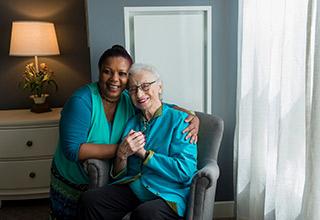Understanding Behavioral Changes Caused by Dementia

Behavioral changes can be one of the most difficult aspects of caring for someone with dementia. Up to 90% of people with dementia exhibit some form of upsetting behavior over the course of their illness. Examples of these dementia behaviors, known collectively as Behavioral and Psychological Symptoms of Dementia (BPSD), include:
- Disinhibition, or poor impulse control. The person with dementia may be rude or tactless, act out sexually or remove his clothing at an inappropriate time or place.
- Mood swings, which tend to happen later in someone who has Alzheimer’s disease than other types of dementia. These moods can include anger, which is also a symptom of depression (particularly in older men, who are less likely to be sad and tearful than women who are depressed).
- Apathy, or loss of motivation or interest. The person with dementia may seem content to spend the day staring at the TV or into space. Apathy is also a symptom of depression — the main difference is that dementia-related apathy has no other depression symptoms.
Typically, one or more of these behaviors will appear after other signs of dementia, like memory problems. One exception is a type of dementia called behavioral variant frontotemporal dementia, in which behavior changes are usually the first noticeable symptom.
Medical assessment is important with any behavior changes. There are other possible causes in addition to dementia, including:
- Medication side effects
- Thyroid disease
- Dehydration
- Infection
- Brain tumor
How do you deal with upsetting behavior? If dementia is the cause, look for triggers and try to change them. For example, if being left alone seems to be a trigger, consider having someone keep your loved one company, or sign her up for social activities or adult day health programs.
If behavioral changes put your loved one’s health or safety at risk, there are practical ways to help protect him. For example, if he tries to wander, you can install an alarm on the door (most home security systems offer a chime). There are also a number of tracking devices available.
Caring for someone with dementia can leave you prone to emotional or physical illness. Sometimes caregivers don’t realize that they’re over the limit until they're hospitalized for a problem. A caregiver support group, either online or in person, can be an extremely helpful way to deal with the stress.
At some point, you may have to think about moving your loved one into an assisted living or long-term chronic care program. There’s no right answer about when to do that – it’s a very individual choice, and it’s not an easy one. Feeling guilty is completely normal, but it’s important to remind yourself that if you get ill, you won’t be able to help your loved one.
Blog Topics
Learn More
Free Guide to Brain Health
Download our free guide, “Optimizing Your Brain Health,” for expert advice on boosting brain health at any age. Explore practical tips and resources from Hebrew SeniorLife’s Deanna and Sidney Wolk Center for Memory Health.

Wolk Center for Memory Health
The Deanna and Sidney Wolk Center for Memory Health at Hebrew SeniorLife provides outpatient memory care services, in person and virtually, for people living with cognitive symptoms — and for their families and caregivers.





